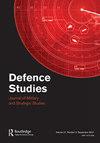European defence in an interpolar context: explaining the limitations of French-German contribution to European strategic autonomy
Q1 Arts and Humanities
引用次数: 3
Abstract
ABSTRACT European strategic autonomy has become a common motto since the EU’s Global Security Strategy (2016). France and Germany have for several years been playing a leading role in promoting the concept even though they share quite different views on what such autonomy should aim for, especially in a context of multipolarity and power re-configurations. This article analyzes the role of French-German input in European strategic autonomy relying on two criteria: input legitimacy (procedures) and output legitimacy (efficiency). Based on three concrete examples (the MPCC, PESCO, and the European Strategic Compact), the article explores the French-German input in developing European autonomous military tools and capabilities and seeks to explain the legitimacy of this input based on factors such as the historical legacy of French-German military cooperation and the use of political symbolism. Then the article focuses on the question of the efficiency (output) of this bilateral input in European strategic autonomy. The main advantage of this approach is its explanatory power to capture the hiatus between the strong output legitimacy that Paris and Berlin bring into European strategic autonomy and its rather limited empirical output produced. This hiatus can be explained by strategic cultural divergences between Paris and Berlin.极间背景下的欧洲防务:解释法德对欧洲战略自主贡献的局限性
摘要自2016年欧盟《全球安全战略》颁布以来,欧洲战略自主已成为一个共同的座右铭。几年来,法国和德国一直在推动这一概念方面发挥着主导作用,尽管他们对这种自治的目标有着截然不同的看法,尤其是在多极和权力重组的背景下。本文从两个标准来分析法德投入在欧洲战略自主中的作用:投入合法性(程序)和产出合法性(效率)。基于三个具体的例子(MPCC、PESCO和欧洲战略契约),本文探讨了法德在发展欧洲自主军事工具和能力方面的投入,并试图基于法德军事合作的历史遗产和政治象征的使用等因素来解释这种投入的合法性。然后,本文重点讨论了这种双边投入在欧洲战略自主中的效率(产出)问题。这种方法的主要优势是它的解释力,可以捕捉到巴黎和柏林为欧洲战略自主带来的强大产出合法性与其产生的相当有限的实证产出之间的脱节。这种中断可以用巴黎和柏林之间的战略文化分歧来解释。
本文章由计算机程序翻译,如有差异,请以英文原文为准。
求助全文
约1分钟内获得全文
求助全文

 求助内容:
求助内容: 应助结果提醒方式:
应助结果提醒方式:


